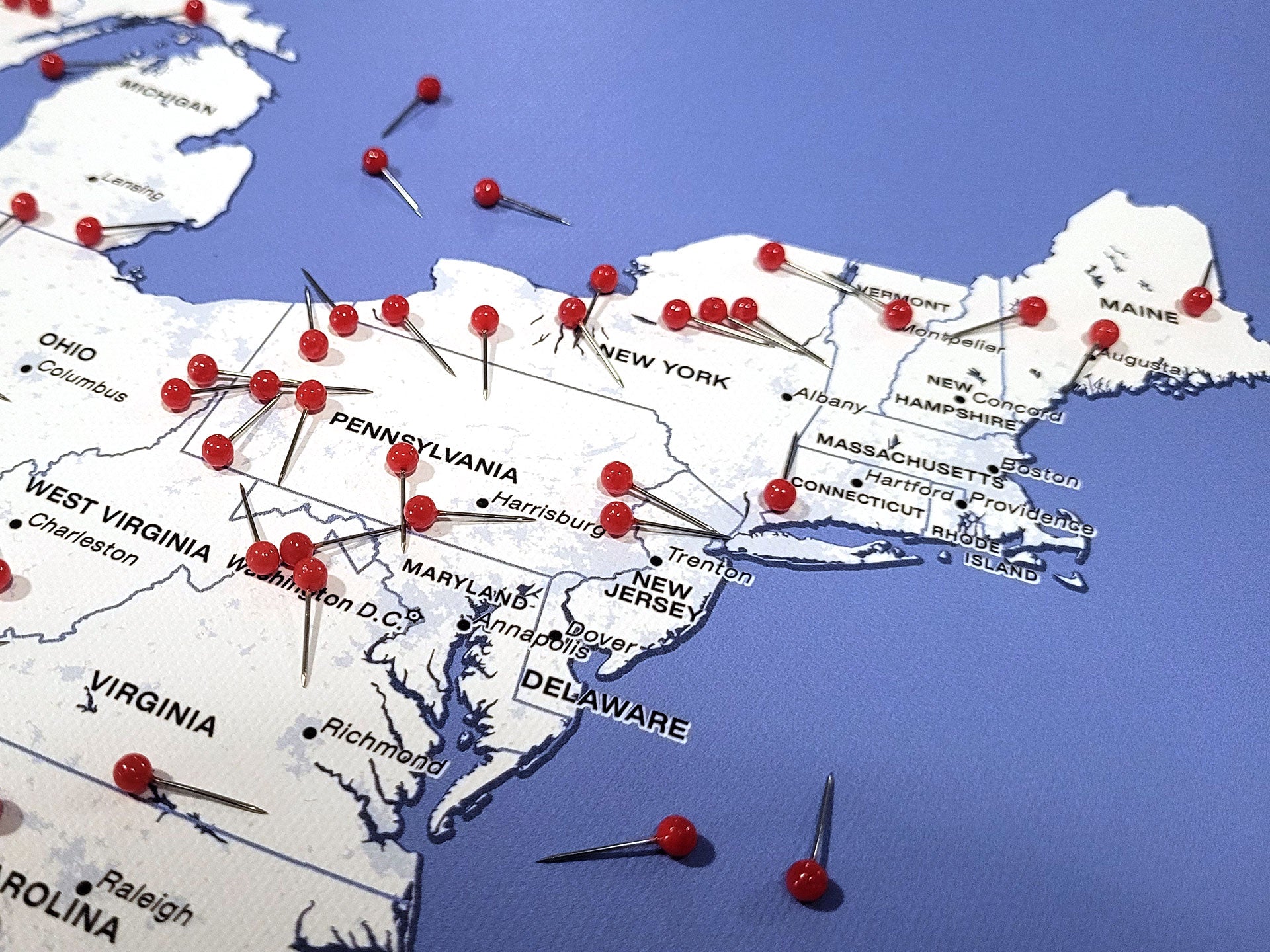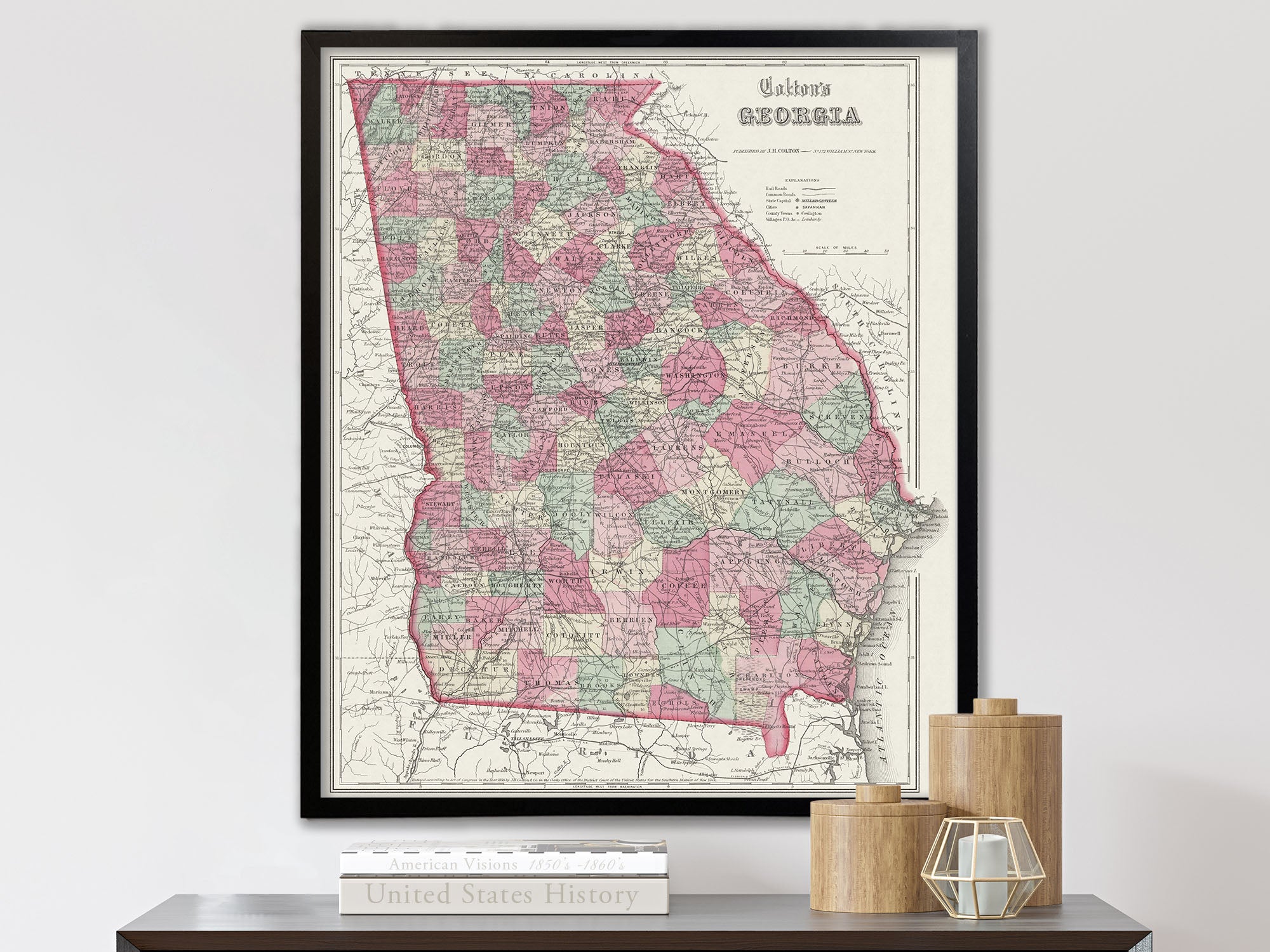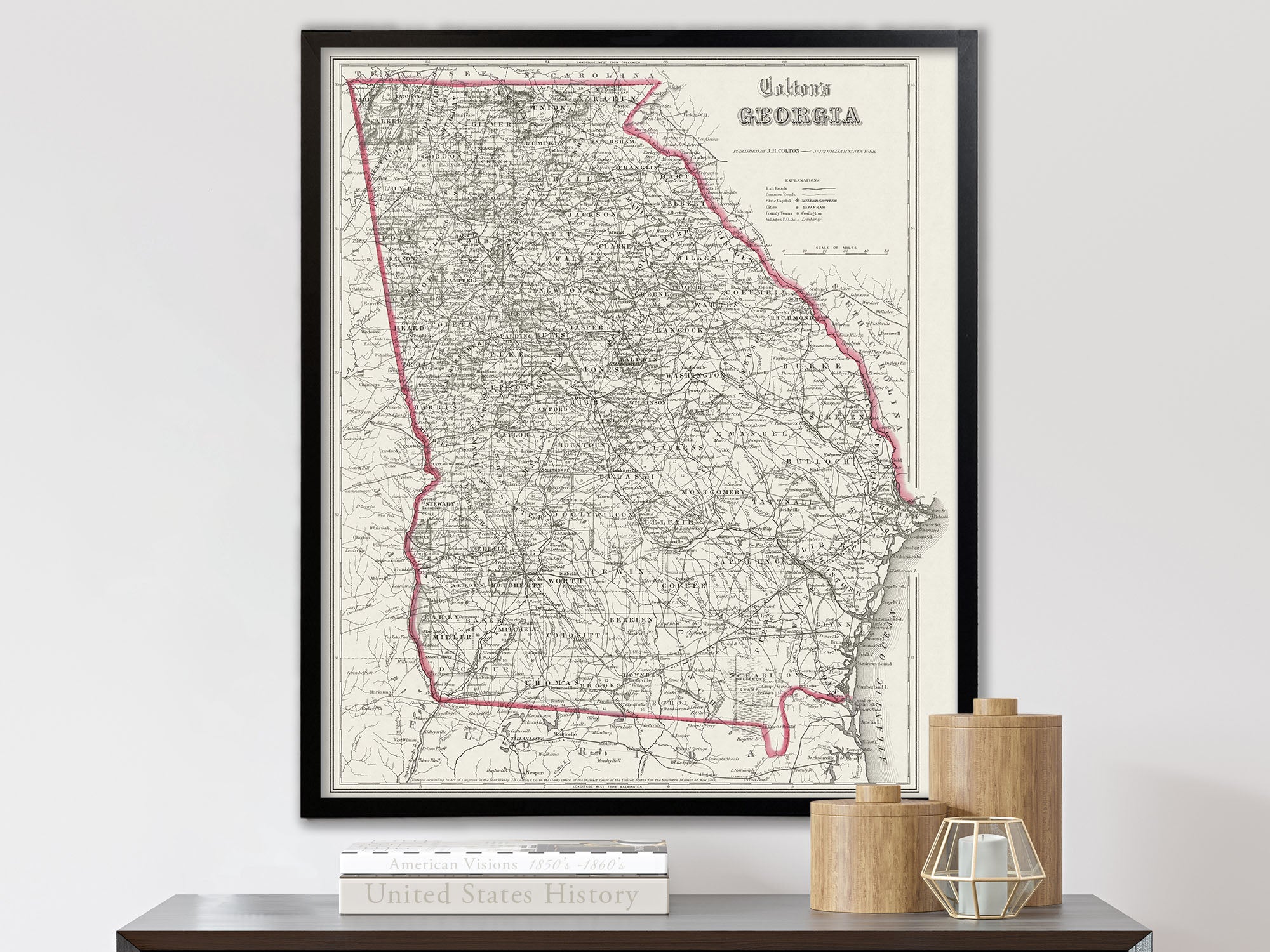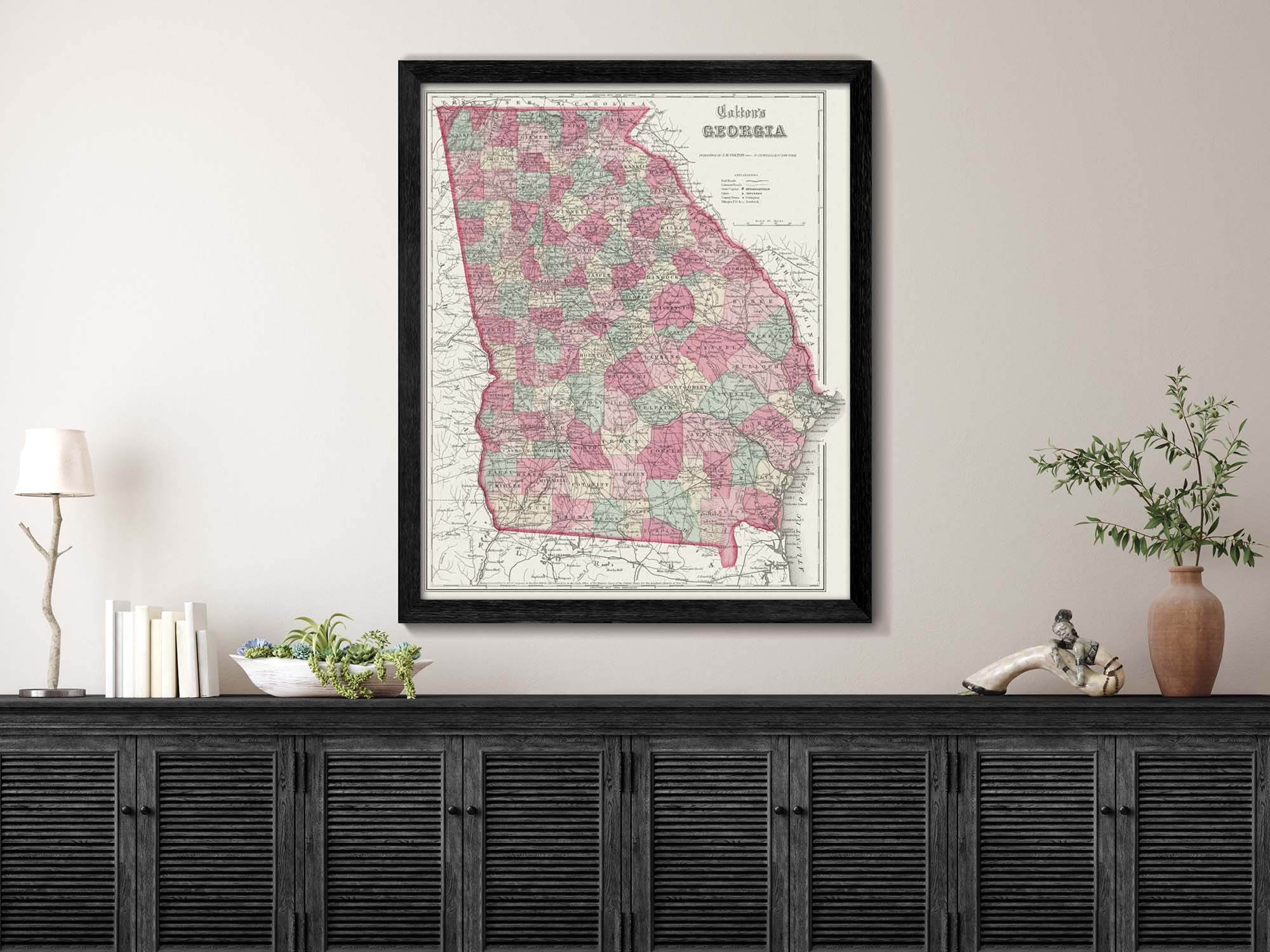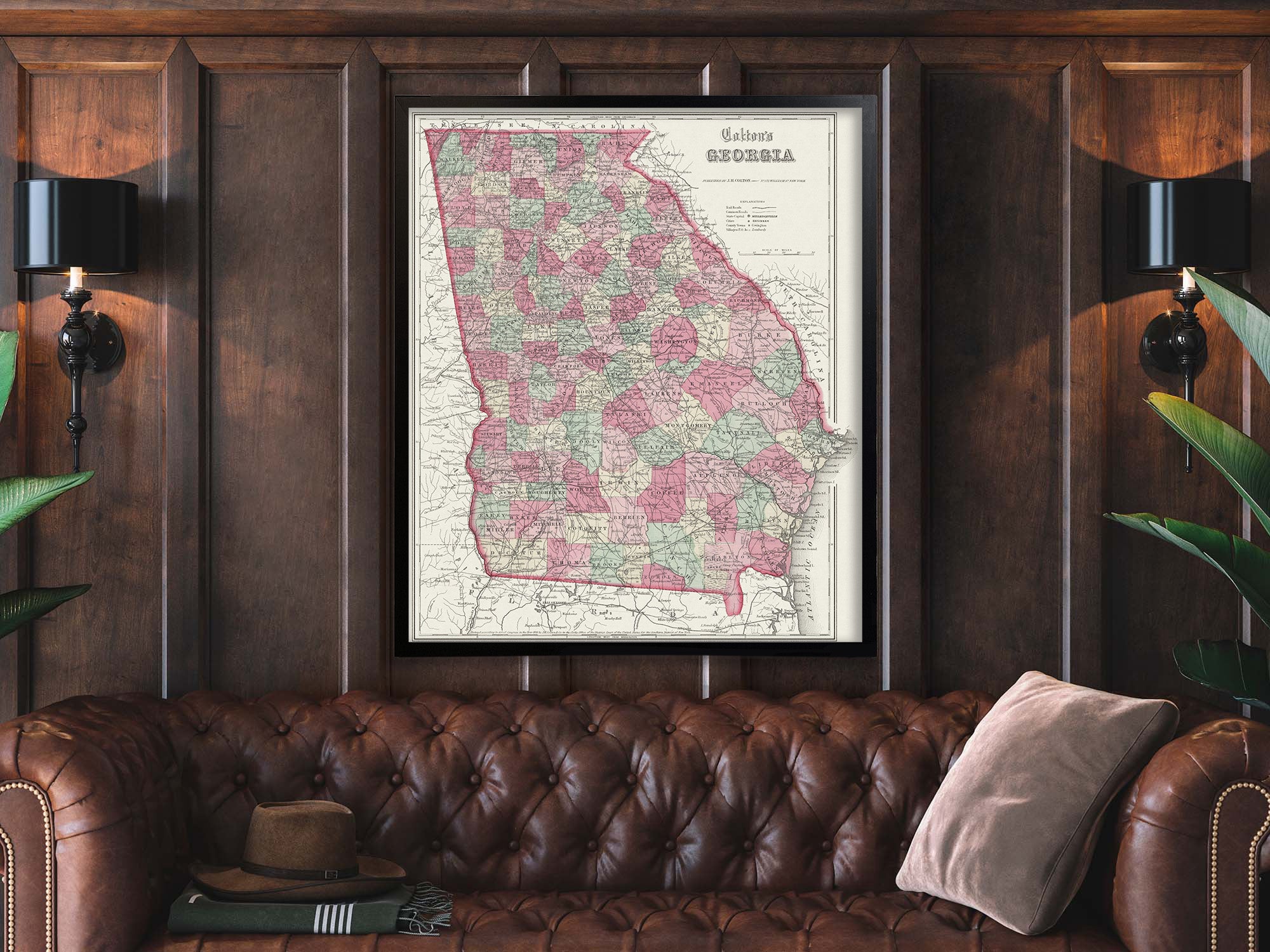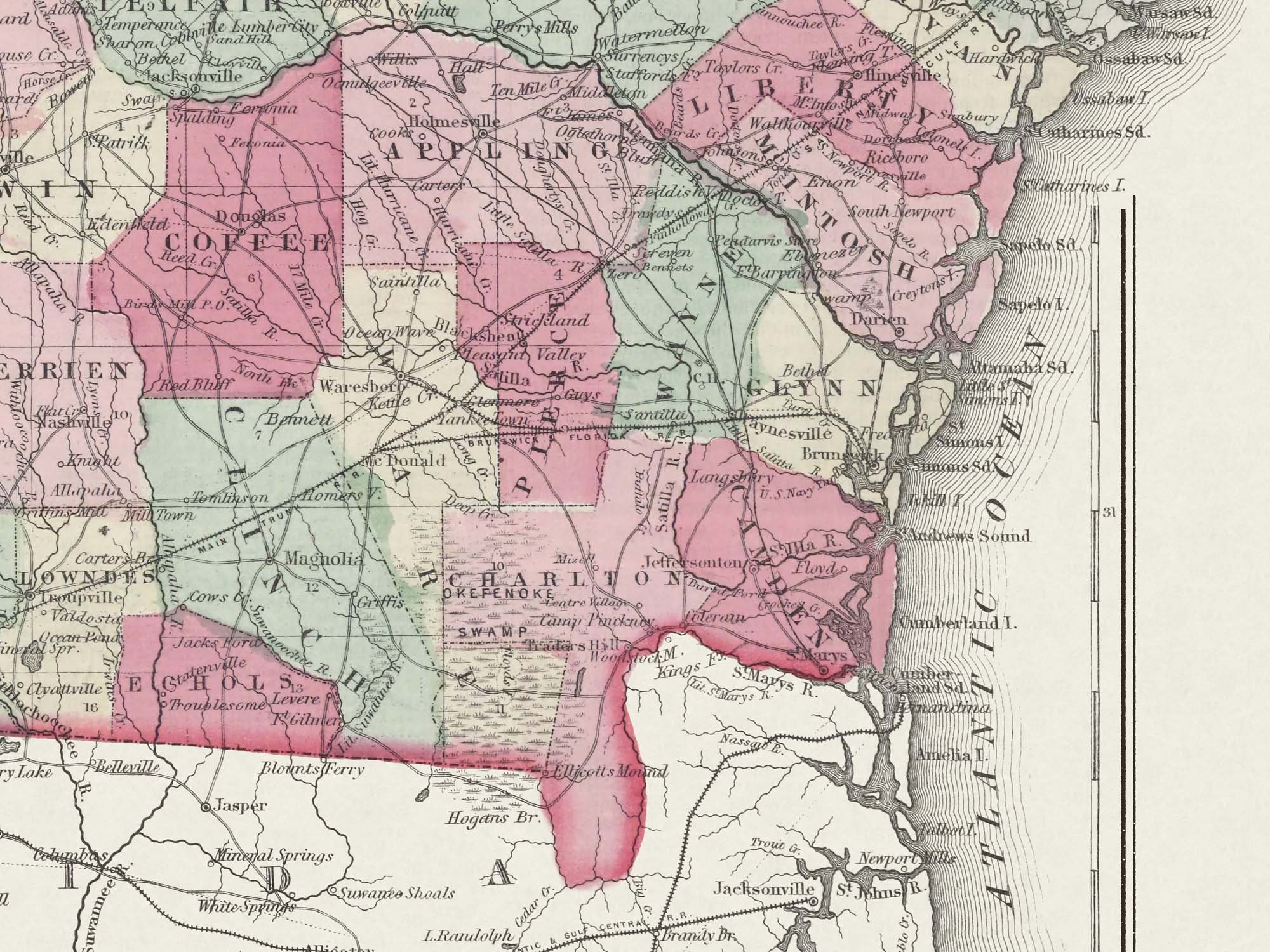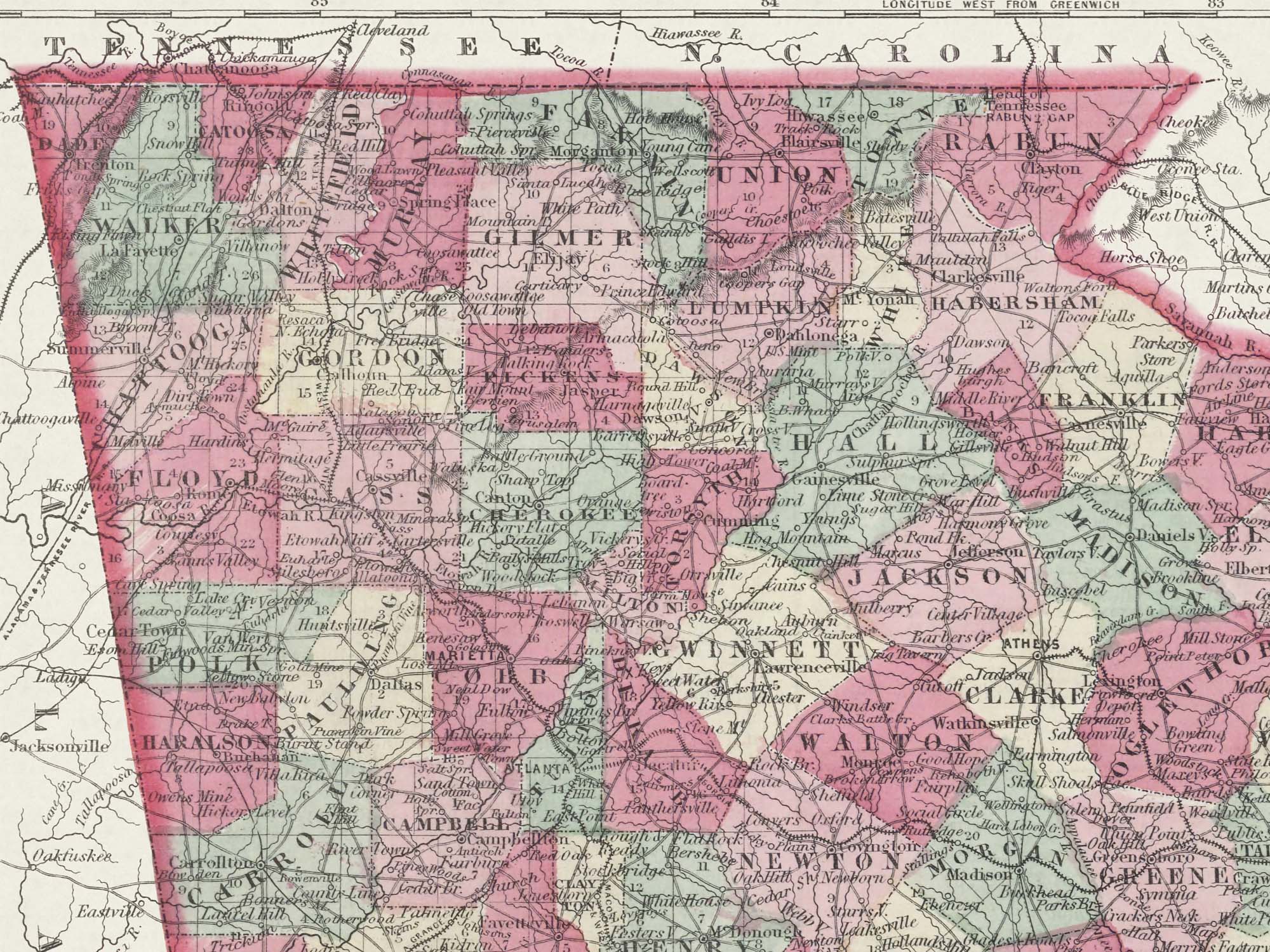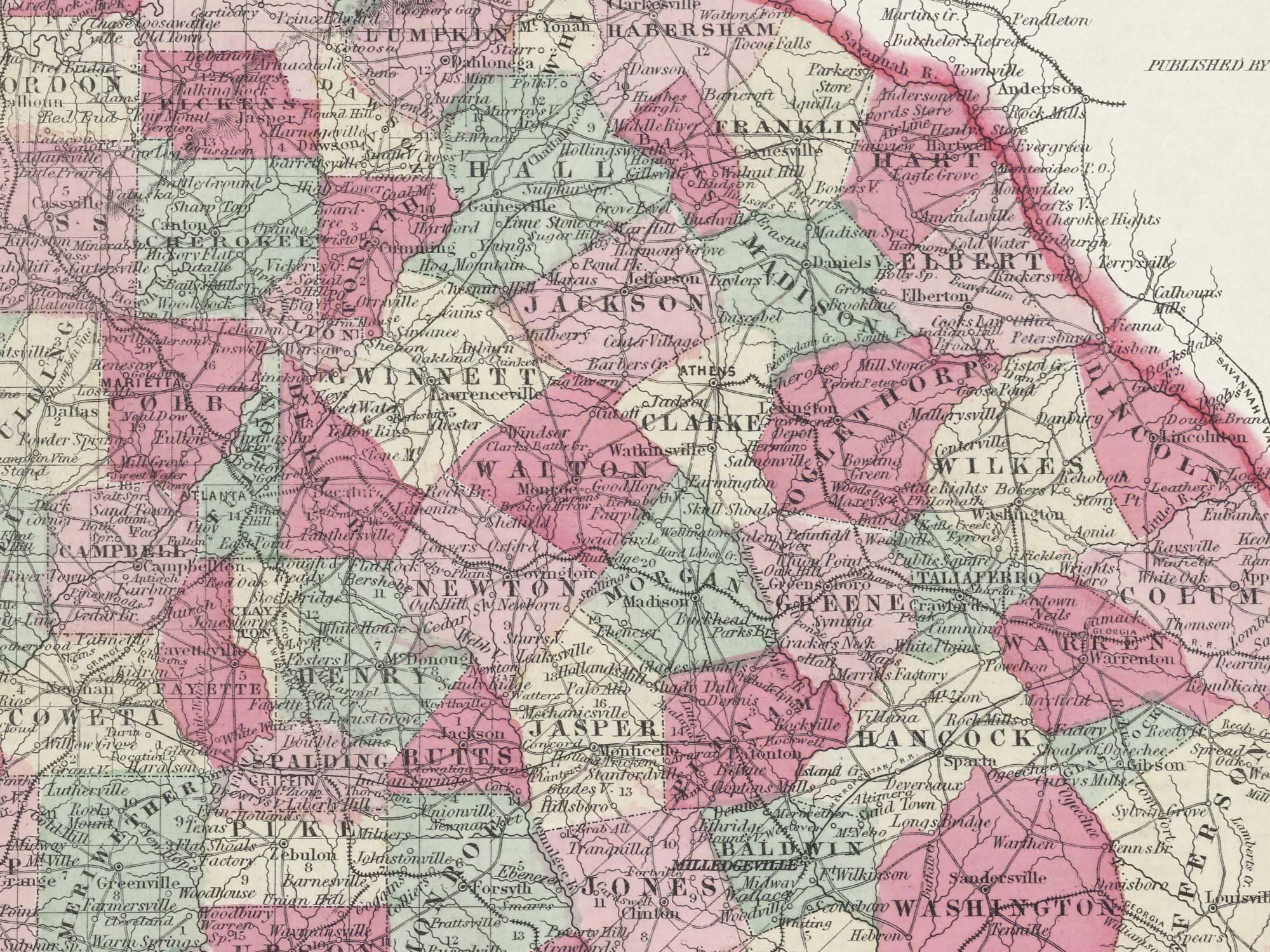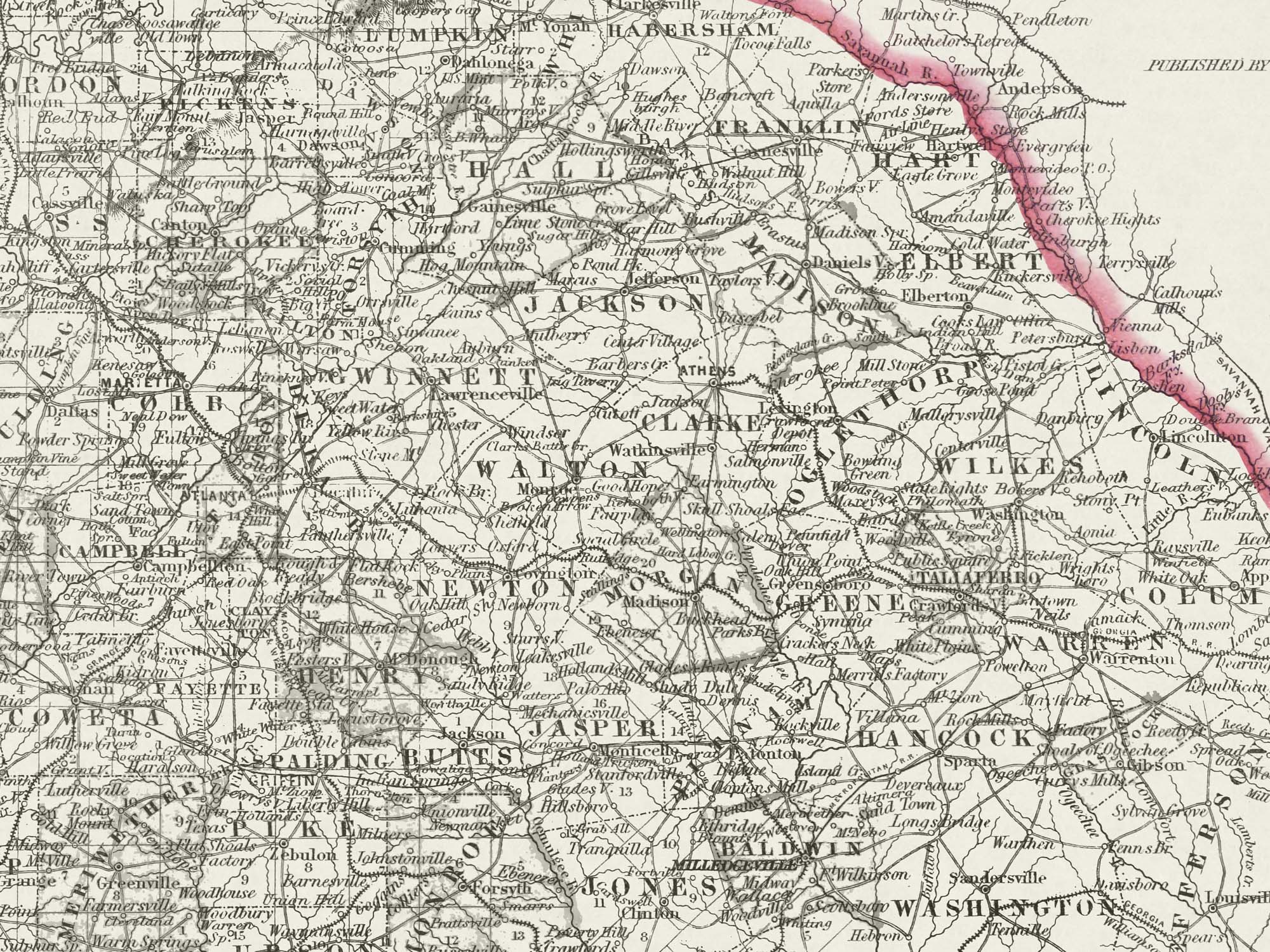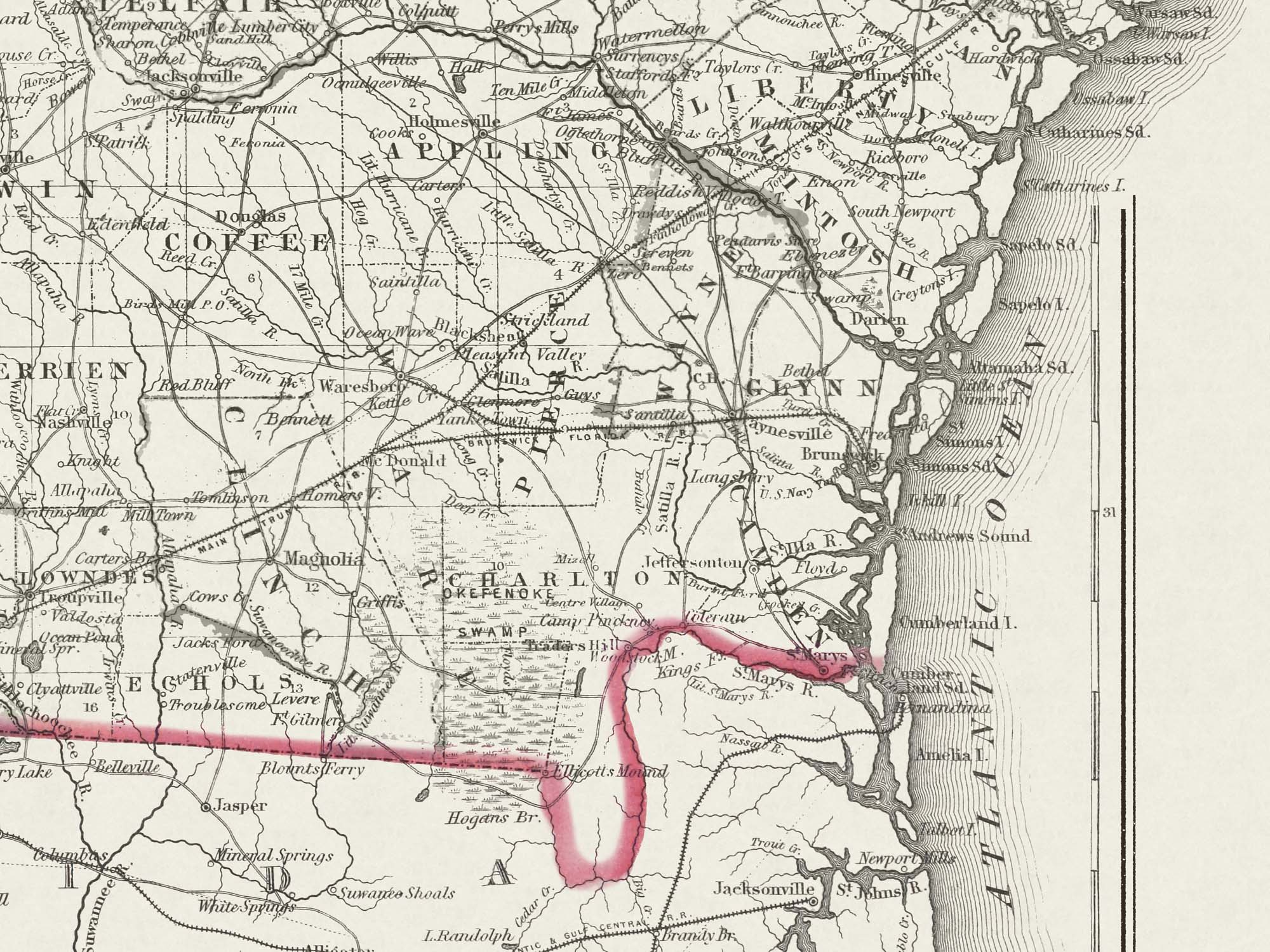This map is a faithful reproduction of the original 1850 map restored to its former glory using the latest digital imaging technology.
Antique State Map of Georgia
Standard maps will enter production right away, within the next business day. Larger orders may take more time.
All push pin board maps (framed or canvas wrap) include push pins, are easy to hang, and ship free in the continental US. We'll select the optimal shipping method for fast delivery.
For personalized maps we collaborate closely to guarantee satisfaction. Expect a proof to be sent to you. Your swift responses will facilitate the production and shipping process.
If there are any problems with your map we will take care of you. Returns for all maps are straightforward and hassle-free.
For personalized maps, engaging with the email proofs we send ensures that the final product meets your expectations precisely.
We have 30+ years of cartography experience, meticulously craft each order by hand to ensure excellence, and 100% guarantee your satisfaction. We produce maps that are built to last, with state of the art production and archival quality materials.
Customize with quotes, legends, or dedications using "Personalize Map" options to craft your masterpiece map. Or reach out to us if you don't see the option you want.
We collaborate with you from design to approval of your proof so that you are 100% happy before we print and ship.
Our excellent customer service is always open to you.
Restored 1850's Map
Fine Art Quality
Impressively produced with Archival Inks, Rich Color Depth, and clear and vivid labels. We use premium matte paper.
Expert Craftsmanship
We prepare the map using Fine Art Giclee production techniques. We roll the map in a sturdy tube for shipping to provide a crease-less piece of art.
Antique State Map of Georgia
- Description
- Specs & Construction
About the Map: Explore the geographic history of the state of Georgia in this historic map. This map is part of our vintage USA State Map Collection showing the geography of the states in the 1850-1860s and the time of the Civil War.
Restoration: The map is a reproduction of the original map meticulously restored to its former glory using the latest digital imaging technology. Using this technology, we carefully restored the colors, torn edges, creases, smeared writings and more. We enhanced features while keeping the original character and design of the map.
Geographic Details: This historic map shows many details of towns, roads, railroads, and waterways in the 19th century of the United States.
Shows historic cities such as Atlanta, Columbus, Savannah and more!
Explore the historic boundaries of the cities, counties, and states that have changed over the years. Discover physical changes in the geography - such as former lakes and canals used for transportation and agriculture.
This map is unframed, sold as an art print. Frames are shown for illustration ONLY.
Available Sizes: For an impressive display and maximum readability, choose the largest size available.
Smaller size prints make excellent wall art in groups. Please note that there is no guarantee that small text will be legible in print.
Great Gift For: Interior Designers, Teachers, History Buffs, Anniversaries, Birthdays, Friends, Family, and many more!
Production and Shipping Times: The amount of time it takes for your map to arrive depends on where you live and how fast you approve the proof if you’ve ordered a custom map. See Production & Shipping.
Quality and Guarantee: We stand behind our work and guarantee the construction and quality. Contact us if you have any problems with your map and we will coordinate to ensure you are very happy with your purchase.
Materials and Production: This reproduction is printed on Fine Art Museum Quality Paper with giclée inks. The thick paper is archival quality and acid-free with vivid color definition. Paper details:
- 10 mil thick
- 230 gsm weight
- Museum Quality Matte finish
Made in the USA by a USA Small Business and Professional Geographer & Cartographer.
Shipped in a tube and rolled to eliminate creases.
Why choose GeoJango Maps
- We have a lifelong passion for maps, backed by 30+ years of cartography experience and Master's Degrees in Geographic Information Systems (GIS) from Penn State University and Environmental Science from the University of South Florida.
- Our incredible investment into the design of our maps results in unparalleled detail that matters: they will educate you, and grow with you as you travel the world and track your travels—where other maps miss the mark.
- We’ve built the leading map production studio in the USA and use exclusively USA-made materials. Each pin map is proudly crafted by hand, printed by us on the finest materials, mounted on museum-quality Gatorfoam, and carefully framed just for you.
History of the Time
The 1850s were a significant period in the history of Georgia, marked by economic growth, political tensions, and the debates over slavery that would ultimately lead to the state's involvement in the Civil War. This decade shaped Georgia's trajectory as it navigated the changing landscape of the United States.
Economically, the 1850s marked a period of expansion and transformation for Georgia. The state's economy was primarily agrarian, with cotton as the dominant crop. Georgia's fertile land and favorable climate made it a prime location for cotton cultivation, and the cotton industry played a central role in the state's economy. The increasing demand for cotton on the global market fueled economic growth and led to a rise in plantation agriculture.
The expansion of railroads in Georgia during the 1850s played a pivotal role in the state's economic development. The railroads facilitated the movement of goods, connecting the interior of the state to coastal ports like Savannah and Brunswick. This connectivity opened up new opportunities for trade and commerce, contributing to the growth of cities and towns.
The issue of slavery was a defining aspect of Georgia's history during this decade. Slavery was deeply entrenched in the state's society and economy, particularly in the cotton-growing regions. The debates over the expansion of slavery into new territories and states intensified, and the passage of the Fugitive Slave Act in 1850 further heightened tensions between the North and the South.
The political landscape of Georgia in the 1850s was influenced by the national debates over slavery and sectionalism. The state's political leaders had to navigate the delicate balance between pro-slavery and anti-slavery sentiments. While Georgia was firmly aligned with the southern states and the defense of slavery, there were also differing opinions within the state about the best course of action.
The emergence of the Republican Party, which opposed the expansion of slavery, had an impact on Georgia's political dynamics. The party's rise and its growing influence on the national stage deepened the divide between North and South. Georgia's political leaders grappled with how to respond to these challenges, and the state's position on secession became a prominent topic of discussion.
By the end of the 1850s, Georgia was on the brink of a pivotal moment in its history. The election of Abraham Lincoln as President of the United States in 1860 and the subsequent secession of southern states triggered a chain of events that led Georgia to convene a secession convention in early 1861. The state ultimately chose to secede from the Union and join the Confederacy, marking the beginning of its involvement in the Civil War.
In conclusion, the 1850s were a transformative period for Georgia, marked by economic growth, political debates, and the intensifying tensions over slavery. The state's reliance on cotton cultivation, its position on secession, and its alignment with the South had profound implications for its role in the upcoming Civil War. As Georgia entered the 1860s, the decisions and actions of the 1850s would shape its destiny and contribute to the broader narrative of American history.






